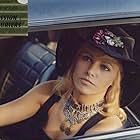"La bande du Rex", directed by Jean-Henri Meunier, is a mixed bag at best. It is one of those films who give a detailed and complacent account of the doings and misdoings of a gang of no-goods. And to tell the truth, the young "heroes" of this trite tale, Patricia, a superficial gas station cashier, Richard, a soldier on furlough, François, the son of a police captain, P'tit Jeannot, a student who fails at school, Dingo and Badou as well as their guru Daniel aka Frankie Mégalo, a film projectionist and amateur rocker, are far from fascinating. They hang around on the streets, talk idly, snicker, drink and make love, good for them! Their only positive feature, their common love for rock'n roll music, is not enough to make them touching or at least engaging. The main defect of "La bande du Rex" lies just in that : its characters are hollow and when, by the end, tragedy strikes them, sympathy just cannot set in. Of course, the rebelliousness of youth, teen angst and the generation gap can give rise to masterpieces ('Rebel Without a Cause', 'Family Life', 'The Virgin Suicides', and many others), but to touch the audience, there must be a serious psychological and/or sociological study to set the misdemeanors of the young rebels against. Which is not the case of Meunier and novelist Nan Aurousseau's superficial script. The logical result is the boredom that affects most of the running time of this disappointing movie. Not everything is bad in 'La bande du Rex", though. The actors' direction is good, both the young amateur players and the professional character actors who play their parents or police forces (Nathalie Delon Maurice Biraud, Feodor Atkine, Henri Poirier, Claude Melki) are convincing. Technically, the film is acceptable on the whole (though the editing could have added some snap to the whole thing). On the other hand, the director occasionally has some effective staging ideas (the giant shadows of the fugitives, the off-screen police captain's suicide and his right-hand man's on screen cynical comment) that sporadically enhance the film above average. The rare action scenes are rather well made as well. But the movie's biggest (guilty) pleasure is the presence of singer Jacques Higelin, then at the end of his rock period. Not content with composing the score, he sings, dances and acts, bringing much conviction to his character in an undertaking in which he apparently believed strongly. All in all, not a shameful film, but not a necessary one either.







